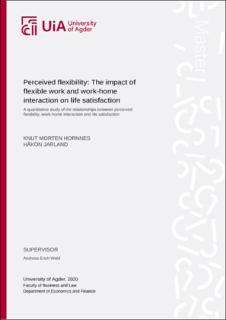| dc.contributor.author | Hornnes, Knut Morten | |
| dc.contributor.author | Jarland, Håkon | |
| dc.date.accessioned | 2020-09-25T11:13:15Z | |
| dc.date.available | 2020-09-25T11:13:15Z | |
| dc.date.issued | 2020 | |
| dc.identifier.citation | Hornnes, K.M. & Jarland, H. (2020) Perceived flexibility: The impact of flexible work and work-home interaction on life satisfactionA quantitative study of the relationships between perceived flexibility, work-home interaction and life satisfaction ( Master´s thesis). University of Agder, Kristiansand | en_US |
| dc.identifier.uri | https://hdl.handle.net/11250/2679697 | |
| dc.description | Master´s thesis in Business Administration (BE 501) | en_US |
| dc.description.abstract | The aim of this study is to investigate the effect of perceived flexibility and work-home interaction on life satisfaction. The lack of previous research, on the direct connections between the variables, perceived flexibility, and life satisfaction, resulted in the purpose of this study. Work-home interaction has indications of connection to both perceived flexibility and life satisfaction (Hill et al., 2001: Clark, 2000: Vodanovich et al., 2006), and was of that reason presented as a possible mediator. Based on this, hypotheses regarding the relationship between the variables were created.In order to test the seven hypotheses, the method of choice in this study was a quantitative approach using an online questionnaire. The online questionnaire was distributed through email, to potential respondents from organizations in Norway. A total of 810 of the respondents completed the questionnaire.The main findings in this study suggest that perceived flexibility has a positive effect on life satisfaction. The findings also indicated that positive work-home interaction had a positive mediating effect on this relationship. A relationship between work-home interaction and life satisfaction was also identified, as positive work-home interaction had a positive effect on life satisfaction, while negative work-home interaction had a negative effect on life satisfaction. The results confirmed all of the hypotheses, except that there was no evidence to support the mediating effect of negative work-home interactionon the relationship between perceived flexibility and life satisfaction.According to the results in this research, higher perceived flexibility increases life satisfaction. In addition, to contribute with new findings, the results also provide findings that are supported by previous research. Considering the abnormal situation at the distribution time, the results could highlight some interesting perspectives regarding covid-19, in relation to flexible work and work-home balance. The results in this study, allows potential future research a starting point, to further investigate the impact and consequences of the abnormal situation in relation to an individual’s perceived flexibility and life satisfaction. | en_US |
| dc.language.iso | eng | en_US |
| dc.publisher | University of Agder | en_US |
| dc.rights | Attribution-NonCommercial-NoDerivatives 4.0 Internasjonal | * |
| dc.rights.uri | http://creativecommons.org/licenses/by-nc-nd/4.0/deed.no | * |
| dc.subject | BE501 | en_US |
| dc.title | Perceived flexibility: The impact of flexible work and work-home interaction on life satisfactionA quantitative study of the relationships between perceived flexibility, work-home interaction and life satisfaction | en_US |
| dc.type | Master thesis | en_US |
| dc.rights.holder | © 2020 Knut Morten Hornnes & Håkon Jarland | en_US |
| dc.subject.nsi | VDP::Samfunnsvitenskap: 200::Statsvitenskap og organisasjonsteori: 240::Offentlig og privat administrasjon: 242 | en_US |
| dc.source.pagenumber | 110 | en_US |

